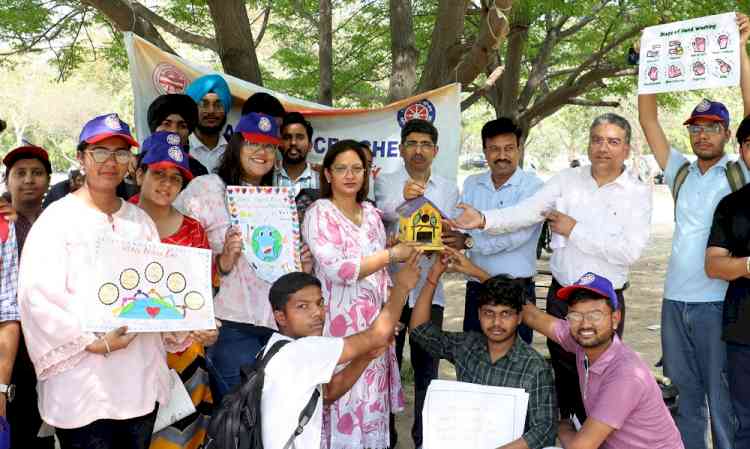Panjab University Researchers Granted Patent for Revolutionary Biodegradable Food Packaging Films to Combat Plastic Pollution and sustainable future
Researchers from Panjab University, Institute of Forensic Science, Dr. Vishal Sharma, Ms. Sonal Choudhary(DST-INSPIRE Fellow), Dr.Kashma Sharma (DAV, College, Chandigarh) and Dr. Vijay Kumar (NIT Srinagar) have been granted an Indian patent for their groundbreaking invention on biodegradable food packaging films designed to replace plastic-based food packaging films.

Chandigarh March 15, 2024: Researchers from Panjab University, Institute of Forensic Science, Dr. Vishal Sharma, Ms. Sonal Choudhary(DST-INSPIRE Fellow), Dr.Kashma Sharma (DAV, College, Chandigarh) and Dr. Vijay Kumar (NIT Srinagar) have been granted an Indian patent for their groundbreaking invention on biodegradable food packaging films designed to replace plastic-based food packaging films.
Annually, the global production of plastic products reaches a staggering 430 million tonnes, a figure projected to potentially triple by the year 2060. Shockingly, only a mere 9 percent of these plastics undergo recycling processes, with the remainder either being incinerated, relegated to landfills, or finding its way into the environment, where degradation can span centuries. Even after this extended period, complete degradation remains elusive, highlighting the persistent and enduring nature of plastic pollution.
This patent encompasses the creation of a biodegradable food packaging film crafted from renewable, environmentally friendly materials, designed for the storage and preservation of food items. The invention addresses the pressing issue of plastic pollution, particularly the presence of plastic particles in water, food, placenta, and the human body, which pose significant health risks. In today's world, plastic pollution, including microplastics and nano-plastics, has become a grave concern, given its widespread presence in our daily lives and its detrimental impact on food safety. Plastic materials can leach into food over time, contributing to various diseases, and humans may inadvertently ingest microplastics from contaminated sources such as drinking water, seafood, honey, sugar, common salt, and plastic-wrapped foods. The biodegradable food packaging films developed by the Panjab University research team offer a promising solution to combat plastic waste and enhance the shelf life of packaged food items.
Moreover, significant volumes of waste are disposed of in plastic packaging, leading to the accumulation of large plastic heaps. Wildlife often ingest this plastic waste, mistaking it for food, resulting in severe health consequences. Our biofilm, made from non-toxic green materials, addresses this issue by being edible and harmless to animals upon consumption, as verified through testing. This packaging film offers an eco-friendly alternative to plastic packaging, particularly benefiting industries involved in the import and export of perishable fruits by preventing spoilage. In addition to extending the shelf life of packaged goods, this innovative product decomposes into soil or water after use. Unlike traditional plastics, which can release harmful chemicals as they degrade, our product leaves no harmful residues. The use of biodegradable films also presents new opportunities for waste management and recycling. As these materials break down, they can potentially be composted, transforming waste into a valuable resource that enhances soil fertility and supports plant growth. Unlike conventional plastics, which can take centuries to decompose, our film is designed for quicker and safer degradation.
Choosing these environmentally friendly alternatives allows businesses and consumers to contribute significantly to reducing our dependence on fossil fuel-derived plastics, thereby mitigating pollution and nurturing a healthier planet for future generations.


 City Air News
City Air News 








